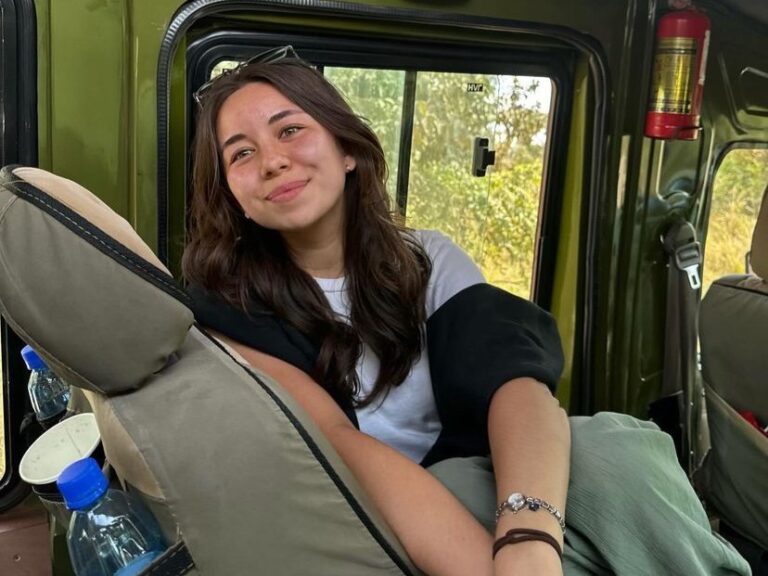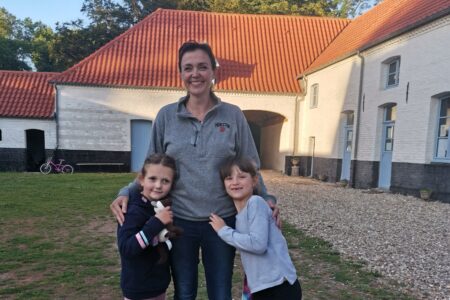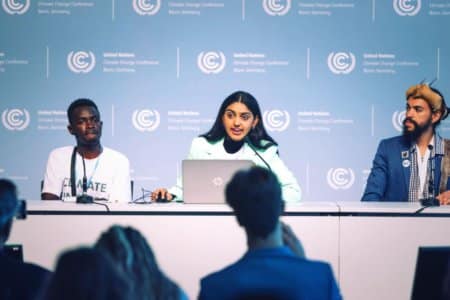
Sex education in India remains taboo and is barely addressed in school, leading to cases of teen pregnancy in the country.
In Assam, more than 6,000 children aged five and under died between the months of May 2022 to March 2023. The cause of death is primarily malnutrition, and most of the children were born from teenage mothers, reports the Times of India.
At least 7.9% of women ages 15 to 19 began child-bearing in 2019-2021. Data show that teenage pregnancy depends on multiple factors, such as early marriage, schooling, socio-economic status, and access to contraception, according to the National Family Health Survey.
Wanting to make a change in Indian communities, Orabel Callahan’s father migrated the family to Mumbai, India, from Jakarta, Indonesia, in 2016 to work with an Indian organisation, which partners with clinics and brands to educate women from underserved communities about sex, contraceptives, and family planning.
Watching her father dedicate his life to the public health sector sparked her interest in the field, especially in child development.
Callahan was raised in Jakarta by a Malaysian mother and an American father. Despite that connection to two different countries, she had never truly lived in either and had only known of life in Indonesia and India later on.
But wherever she was, one thing persisted, and that was child development in underserved communities.
In Mumbai, influenced by her environment and her father’s work in the field, Callahan took her own steps to understanding and making a positive change for others.
She volunteered at the Aseema Charitable Trust, organising book drives for school children, initiating a tablet sponsorship programme to increase educational accessibility, creating a literary programme, and leading a community service club of over 30 students to boost English literacy in Mumbai.
Now, Callahan is a third-year student at Tufts University in the US, pursuing a BA in Child Study and Human Development with a minor in Community Health.
We had the opportunity to speak to Callahan about her childhood and how it inspired her to pursue child development.

Callahan (first on the right) has never lived in Malaysia or the US prior to her studies. Source: Orabel Callahan
What was it like growing up in Indonesia?
As a Malaysian American who has never lived in either of those countries, I was privileged to have an international experience, especially meeting people from different cultural backgrounds.
However, I didn’t like that this was my entire upbringing. I had no prior experience living in the US and Malaysia, and having to move was all I knew. Becoming accustomed to not knowing what else is out there shapes how I perceive things.
When I moved to Mumbai from Jakarta at 11, the cultures changed significantly, especially from Southeast Asia to South Asia. I’m very close to my mum, who’s from Malaysia, so I had a lot of Southeast Asian influence in my life growing up.
Once I got to Mumbai, I was confronted with an entirely new culture, and it was the first time I had to adjust because, up until that point, you don’t know what you don’t know until you experience it.
I did not like change, and to this day, I don’t actively embrace it. But I learned that the more you try to resist it, the more it hurts. So, I also had to be open-minded and be aware of who I was and what my values were compared to everyone around me, whether they were a product of that environment or transplants like me.

In April 2024, Callahan (right) and her coursemates participated in a fellowship at Tufts University that brought them to Rwanda for two weeks to learn about the Rwandan post‐genocide history and reconstruction. Source: Orabel Callahan
How did your childhood influence you to pursue a degree related to child development?
My dad has been in the public health sector for as long as I can remember, so public health has been under my nose the entire time. I would read different snippets of his work over the years, but at that point, I couldn’t put two and two together, so I thought this might be something I wanted to pursue, like child development.
Later, throughout the years, the social troubles I saw while living in those developing countries during my high school years, especially India, and the children I worked with there during my childhood, inspired my passion for undeserved communities.
So yeah, my dad’s job and living in Jakarta and Mumbai blossomed my academic interest in child development and, later, public health.

Despite being born to an American father, Callahan (left) considers herself an international student while studying at Tufts University. Source: Orabel Callahan
Having never lived in the US, do you consider yourself an international student?
I do consider myself an international student.
The question of where I’m from haunts me to this day. Every time I take a new class every semester, I’ll have to introduce myself, and I’ll just say I’m from Pittsburgh because no one will remember any of this.
The reality is that I’m not from Pittsburgh. Although I look and sound American, I don’t associate myself with the place at all; it’s just easier to explain it that way.
It also depends on how big or small the class is and how much effort I’m willing to exert and try to explain where I’m from. Sometimes, when you give the whole shebang, those asking still ask, “Okay, but where are you really from?”
For those who are genuinely curious, I would say, “I’m half Malaysian and half American, but I grew up in Mumbai,” because, between Jakarta and Mumbai, the latter shaped my formative years as opposed to age zero to 10 in Jakarta.
What is the one goal you would like to achieve after graduation?
Education-wise, I plan to graduate school and get a Master’s in Public Health.
Combining my interest in international child development, child welfare, and health policy with my experience growing up internationally, I want to work in child health policy after graduating. I’m yet to see this combination, but I would love to pursue it.
I’d like to work for organisations like UNICEF, the World Bank, or the United Nations, which have the power and resources to implement real change.
For now, I’ll be joining Boston Children’s Hospital as a Health Policy and Government Relations intern in 2025 while studying for my degree in child development.

Callahan (middle) will join Boston Children’s Hospital as a Health Policy and Government Relations intern later this year. Source: Orabel Callahan
Do you have any advice for students constantly moving abroad for school?
Be adaptable and resilient.
For me, time heals all wounds — the wounds of having to leave a place, the connections, the memories, and the familiarity behind them. Time heals that.
With time, you can only build new connections and memories in a new place.
It’s okay to be upset about it. Everyone will tell you to move on and that everything will be fine, but I firmly believe that if you like to have the best experience, you will need to let yourself feel sad about it, for however long that may be. And once you’ve stepped out of this box, life must go on.
You can only fully embrace everything and appreciate it once you’re not holding on to that sadness.
What advice will you give those wanting to pursue child development?
Take calculated risks and explore anything that interests you.
I didn’t know that I wanted to major in public health, and I never thought I would, but then I took a class about it and fell in love with the subject.
Do not be afraid if it doesn’t work out. Go with the flow, try new things, and embrace change. This is a full circle, like embracing change. I’ve had plenty of interest that didn’t pass before I found out I enjoyed the subject.
Support is important, too. I’m really lucky and privileged that my parents are super supportive. They have accepted my intellectual passions and did not force me to become a lawyer, doctor, or engineer.
I understand that this varies from household to household, but the environment they fostered at home allowed me to explore and discuss my interests.
Talking to people is a great skill to have. If you don’t have the confidence to speak to someone in the field you’re interested in because you’re nervous, just talk to whoever you want. Practice the soft skills, and then you can speak to that person when the time comes.
You’ll have the confidence and experience to sell yourself as a person, feel confident, and learn as much as possible. Again, you won’t know if you never try.










